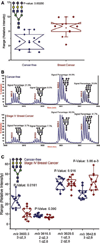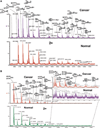Identifying cancer biomarkers by mass spectrometry-based glycomics
- PMID: 22740464
- PMCID: PMC3673023
- DOI: 10.1002/elps.201100715
Identifying cancer biomarkers by mass spectrometry-based glycomics
Abstract
Correlations between aberrant glycosylation and cancer have been established for decades. The major advances in mass spectrometry (MS) and separation science have rapidly advanced detailed characterization of the changes associated with cancer development and progression. Over the past 10 years, many reports have described MS-based glycomic methods directed toward comparing the glycomic profiles of different human specimens collected from disease-free individuals and patients with cancers. Glycomic profiling of glycoproteins isolated from human specimens originating from disease-free individuals and patients with cancers have also been performed. Profiling of native, labeled, and permethylated glycans has been acquired using MALDI-MS and LC-MS. This review focuses on describing, discussing, and evaluating the different glycomic methods employed to characterize and quantify glycomic changes associated with cancers of different organs, including breast, colon, esophagus, liver, ovarian, pancreas, and prostate.
© 2012 WILEY-VCH Verlag GmbH & Co. KGaA, Weinheim.
Conflict of interest statement
The authors have declared no conflict of interest.
Figures






References
-
- Dwek RA. Chem. Rev. 1996;96:683–720. - PubMed
-
- Helenius A, Aebi M. Science. 2001;291:2364–2369. - PubMed
-
- Rudd PM, Woods RJ, Wormald MR, Opdenakker G, Downing AK, Campbell ID, Dwek RA. Biochem. Biophys. Acta. 1995;1248:1–10. - PubMed
-
- Rudd PM, Wormald MR, Stanfield RL, Huang M, Mattson N, Speir JA, DiGennaro JA, Fetrow JS, Dwek RA, Wilson IA. J. Mol. Biol. 1999;293:351–366. - PubMed
Publication types
MeSH terms
Substances
Grants and funding
LinkOut - more resources
Full Text Sources
Other Literature Sources
Miscellaneous

